Specialist Ashley (Pullen) Hawkins, U.S. Army (Retired) – “V” for Valor in Iraq
Everyone faces adversity in life. How an individual deals with that adversity determines the course their life will follow. Specialist Ashley Hawkins, U.S. Army (Retired), has dealt with more than her share of adversity, yet she’s never let it define her. Instead, she confronts it head on and overcomes it, always looking toward a better future. This unwavering determination resulted in her being the first female soldier in U.S. history to be awarded the Bronze Star with a “V” for valor in combat. This is her story.
Ashley was born in 1984 in Danville, Kentucky, a small town located about thirty-five miles southwest of Lexington. To say she had a tumultuous childhood would be an understatement. Her parents were married in 1983 and were very young – her dad was twenty and her mom nineteen. Her mom brought a son from a previous relationship to the marriage and her dad adopted him. Ashley was born a year later, completing the family.
Ashley’s parents lived paycheck to paycheck. Her father quit school at the beginning of seventh grade, making it difficult for him to find work or earn enough to do more than scrape by. As a result, the family lived in a rent subsidized (Section 8) apartment in a poor section of town.
Wanting to provide a better life for her children, Ashley’s mother joined the Navy when Ashley was five. While Ashley’s mom attended boot camp in Florida and follow-on Aviation Electrician’s Mate school in Tennessee, Ashley’s father stayed at home in Danville and took care of the kids. When Ashley’s mother finally transferred to her first permanent duty assignment in Norfolk, Virginia, Ashley’s father moved the family to Norfolk so the family could be together again.
Unfortunately, Ashley’s mother and father began to have problems and split up in November 1990 when Ashley was not quite seven. Her dad moved back to Kentucky and her parents were divorced in May 1991. Tragedy struck two months later when Ashley’s father was seriously injured while working on a railroad track in July 1991. He was in the hospital for two months and it was nine months before he could walk again. Once he was back on his feet, Ashley moved to Kentucky to live with him while her brother stayed with her mother. Each year thereafter, the two kids rotated between their mother’s house in Virginia and later Florida, and their father’s house in Kentucky. That meant Ashley had to change schools every year growing up, never able to put down roots. It also meant Ashley only saw her brother on holidays when overlap in their back-and-forth travel schedules allowed.
A degree of stability came when Ashley turned fourteen. Both her parents had remarried and Ashley went to live permanently with her mother and new stepfather, who now lived in Hardin, Kentucky. For the first time in her life, Ashley attended the same school – Central Hardin High School – for four years in a row. This allowed her to excel in her studies and to participate in extracurricular activities like choir, cheerleading, and Jr. ROTC (which would prove significant down the road). She also worked every day after school, beginning by caring for a neighbor’s young boys and progressing to waitressing at a steakhouse and two local pizza parlors. Despite this busy schedule, Ashley still had time for a boyfriend. She started dating him her freshman year and continued to date him all through high school.
During Ashley’s senior year, she decided to do something to change the trajectory of her life. She wanted to see more of the world than just Kentucky and she did not want to live the life her parents had. Determined to make her life better, she enlisted in the Kentucky Army National Guard on December 17, 2001. Because she was only seventeen, her parents had to give their written permission, which they did. From that moment on, Ashley was a member of the Kentucky Army National Guard.
Although she was still in high school, Ashley drilled one weekend each month starting in January 2002 with the 940th Military Police Company. This meant she had to drive almost eighty miles each way to the armory in Lexington, Kentucky, located in the center of the state. The drive was worth it, though, because she earned $200 each month for participating in the drill weekends. Drilling also gave her the chance to meet the soldiers she would be working with once she completed her initial Army training later in the year.
Ashley graduated from Central Hardin High School with an “A” average in June 2002, just missing the honor roll by a fraction of a point. In September, she reported to Fort Leonard Wood in Missouri for Basic Training, followed immediately by Military Police training at the same installation. She found Basic Training tolerable, although the physical component proved difficult because she was only five-feet, two-inches tall, and while she was very healthy, she was not used to the physical training she soon found herself immersed in. She worked hard at it, though, and by the end of Basic Training, she had the most improved score in her platoon on the physical fitness test.
After training for seventeen weeks at Fort Leonard Wood, Ashley graduated with her new Military Police MOS (military occupational specialty) on December 19, 2002. Because she participated in Jr. ROTC in high school, she was already a Private First Class (E-3), giving her a substantial pay advantage over her fellow graduates, most of whom were still Privates (E-1). She didn’t have time to celebrate, though, because she had enrolled at the University of Kentucky using her GI Bill and had to move to Lexington over the holidays to start classes in January 2003. She also had to return to weekend drilling with her unit, the 940th Military Police Company.
Ashley’s weekend duties with her unit centered around classroom training involving military law enforcement and providing security for major events like the Kentucky Derby. Two weeks each year, the unit conducted unit-level training at the Wendell H. Ford Regional Training Center, located in western Kentucky near Bowling Green. In addition to operating their Humvees (High Mobility Multipurpose Wheeled Vehicles) in the field and conducting mock engagements, they completed their annual firearms training and physical fitness test. In short, the two weeks at Wendell H. Ford were chock-full of training events, allowing the unit to put everything it learned during the weekend drills into practice in the field.
Because she had sufficient time in grade, Ashley promoted to Specialist (E-4) in the spring of 2003. Things progressed on the civilian side of her life, as well. Her foray into college did not go as planned because she felt burnt out after working her way through high school and then completing her seventeen weeks of Army training. She also got engaged to her high school boyfriend in the spring of 2003 and they were married in June of 2004. With Ashley no longer in college receiving the GI Bill, living in Lexington proved too expensive. So, in September 2004, Ashley and her husband moved about two hours away to Metcalfe County, Kentucky, where the cost of living was more affordable.
Ashley’s September 2004 drill weekend at the armory in Lexington fell right in the middle of her move to Metcalfe County. During the drill weekend, she heard a sister unit, the 617th Military Police Company, was deploying to Iraq and that it needed a Specialist (E-4) to deploy with it as one of their Specialists could not go. Ashley suspected she might be one of the people being considered because she had all the necessary qualifications and her maiden name, Ammons, made her appear at the top of the alphabetical list (the Army had not yet changed her name to her married name, Ashley Pullen). To find out for sure, she asked her sergeant if she would be “voluntold” to deploy. He told her no, so she drove back to Metcalfe County to finish moving into her new apartment.
The next day, September 13, 2004, Ashley waited outside a Walmart while her husband applied for a job. At about 1:00 p.m., her sergeant called and told her she needed to get her gear and report to the armory in Richmond, Kentucky, by Wednesday morning because she had been selected to deploy with the 617th Military Police Company. That left her only thirty-six hours to gather her gear, most of which was packed away for her move, put her affairs in order, and report ready for extended duty in Iraq. Although Ashley wished she’d been told about being selected on Sunday so she’d have at least a few more hours to prepare, she gathered what gear she could find and reported as ordered on Wednesday morning, September 15.
Before the 617th Military Police Company could deploy, it had to complete its two-weeks of field training at the Wendell H. Ford Regional Training Center. Ashley joined the unit in time to participate and was assigned to the 4th platoon, 3rd squad. After completing field training, the unit reported to Fort McCoy in Wisconsin around October 5 for mobilization training. That training lasted until just before Thanksgiving, when the unit boarded a flight headed for Camp Arifjan in Kuwait, which served as the jumping off point for Army units deploying into Iraq.
Ashley and the 617th Military Police Company flew into Baghdad and were in place by Thanksgiving at Camp Liberty, a large U.S. and Coalition military base located northeast of Baghdad International Airport. The unit commenced operations immediately, providing route security for convoys traveling between, and bringing supplies to, various military facilities in the area. The convoy routes were hazardous, with convoy vehicles often coming under attack from Iraqi insurgent forces or incurring damage from Improvised Explosive Devices (IEDs) placed along the highways. Ashley’s job, together with the rest of the members of her squad, was to patrol the roads in advance of the convoys to make sure they were safe for the convoys to pass. This meant looking for anything unusual – road construction, animal carcasses, or other signals – that might indicate the presence of an IED or a potential ambush. They also established checkpoints to inspect passing vehicles for weapons or possible insurgents preparing to attack the convoys.
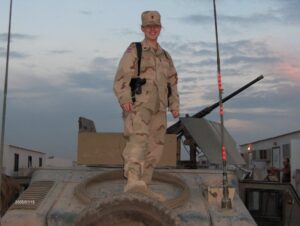
As route security operations began, Ashley transferred to the 4th platoon, 2nd squad (call sign “Raven 42”) to replace an individual who had to be evacuated from Iraq. Ashley drove one of the three Humvees assigned to her squad. This meant she had to maintain the vehicle in fighting condition at all times. If her vehicle needed an oil change at the end of the day, she couldn’t hit the rack until the job was finished. Tires needed to be checked and radios maintained, supplies needed to be stowed, and the Humvee’s .50 caliber machine gun in the turret atop the vehicle had to be fully operational. All of this proved a challenge in the unforgiving environment of the Iraqi desert. But the squad could not afford to have a Humvee fail on a mission because that would put the crew at risk, so Ashley took her responsibilities seriously.
Providing route security proved challenging from the start. Around January 18, the squad was warned of a potential ambush of a convoy, but it could not locate any insurgents. A week later after a similar warning, the squad secured two prisoners. Then, on February 2 at about 7:15 a.m., Ashley’s Humvee hit an IED just after departing Camp Liberty. The bomb detonated behind the driver’s seat, damaging the vehicle and taking it out of action. Unbelievably, no one in the Humvee was injured, although Ashley found a small splinter of shrapnel in her hand the next day, which she removed herself. Nine days after the IED attack, Ashley turned twenty-one.
Ashley received a brand-new Humvee to replace her disabled vehicle during the first week of March 2005. It took time to set up the vehicle, as Ashley’s squad leader, Staff Sergeant Timothy Nein, wanted all three of the squad’s Humvees configured identically so the crews could operate from any of them and find what they needed quickly in an emergency. Staff Sergeant Nein’s foresight would prove crucial in the coming weeks.
In mid-March, the 4th platoon, 2nd squad was dispatched to Camp Cuervo, a base camp located about six miles southeast of Sadr City on the outskirts of Baghdad. The squad’s mission was to provide security for convoys heading to and from the camp. Insurgents were active in the area, as the squad observed first-hand when an IED disabled a convoy truck on March 18. Ashley’s squad reported to the scene and secured the area until the truck and the supplies it carried were hauled away twenty-six hours later.
Ashley’s squad did not have an assignment on March 19 given their twenty-six-hour mission the day before. However, first thing in the morning on March 20, they were back on the roads again, this time in the vicinity of the town of Salman Pak, located about thirty miles south of Baghdad. As was the standard practice, the three Raven 42 Humvees got an early start to do an initial sweep of the roads. The squad then stopped long enough for another squad to deliver them breakfast and take their place on the road while they ate. As they finished their breakfast, they saw a large truck convoy file past, so they mounted their Humvees and fell in behind the convoy. Ashley drove the second of the three Humvees.
After about ten minutes, they noticed the trucks up ahead driving erratically. With the vehicle noise, the windows up, and their earplugs in, they couldn’t hear anything, but their experience told them the convoy was under attack. Immediately, the three Raven 42 Humvees went into action, speeding up and passing the convoy trucks on the right until they came to an access road running perpendicular to the highway. Staff Sergeant Nein and his lead vehicle turned onto the access road and Ashley followed about fifty feet behind, the turret gunners in both Humvees now exchanging fire with insurgent fighters. After they’d driven about 300 yards down the access road, Ashley saw a rocket-propelled grenade (RPG) hit Staff Sergeant Nein’s vehicle in the rear passenger door. Although the explosion didn’t shatter the door’s window, it did push the Humvee to the left and the turret gunner went down. Moments later, the gunner was back in the turret firing again—a good sign.
At this point everyone exited Staff Sergeant Nein’s and Ashley’s Humvees, except the turret gunners, who continued firing at insurgent positions. As bullets pinged off the Humvees and grenades exploded around them, the crews of the two lead vehicles returned fire with their M4 carbines. Ashley moved behind her vehicle and fired a magazine of suppressing fire in the direction of the insurgents engaging her squad from the right. As she did, she saw Staff Sergeant Nein run to a tall berm along the left side of the road and throw a grenade behind it, alerting Ashley to the attack from that side of the road. After Ashley fired about half the rounds in her second magazine, she heard a call for help coming over her vehicle’s radio from the third Humvee. She looked back and saw it had stopped just after turning onto the access road and was about 300 yards behind her vehicle. As she moved back to the driver’s side of her Humvee and began to talk on the radio to the third vehicle, Sergeant Leigh Ann Hester, also from Ashley’s Humvee, loaded up with grenades and magazines for her M4.
Ashley recognized the voice on the radio—it was the squad’s medic, Sergeant Jason Mike. He said everyone in the third vehicle was down and they needed help. Ashley got out of her Humvee and shut the door just as Staff Sergeant Nein approached. He asked her what her situation was and she reported the third vehicle’s predicament. His direction was simple: “Okay, take care of it.” That was all Ashley needed to hear. She climbed into her vehicle, did a J-turn, and drove back toward vehicle three. She stopped about 100 yards from the vehicle and positioned her Humvee so the turret gunner could continue to return fire. She then got out of the vehicle and ran the rest of the way to Humvee number three, all the time with the firefight going on around her.
When Ashley arrived, she found the vehicle’s turret gunner, Specialist William Haynes, still firing. She asked him if he was okay and he gave her a bloody thumbs-up, having been shot in the hand. Sergeant Mike was returning fire in the direction of a concrete building Ashley hadn’t noticed before, using a rifle he’d picked up. Ashley found another soldier, Specialist Bryan Mack, shot in the shoulder and she helped apply pressure to his wound before moving to the front of the vehicle, where she found the vehicle’s team leader, Sergeant Joseph Rivera, lying on the ground in a pool of blood and mud. She looked for his wound and found he’d been shot in the abdomen, the bullet having entered just below his body armor. She pulled out her bandage and applied pressure to the wound, all the time with Sergeant Rivera telling her to leave him and take care of his men.
Believing there had to be an exit wound, Ashley checked and found Sergeant Rivera bleeding out of his back. That meant she needed more bandages, but none were available where she was. Leaving her rifle with Sergeant Rivera, she ran back down the road to her Humvee, all the time exposed to enemy fire. After opening some ammunition cannisters for her turret gunner, she grabbed a first aid kit and ran the 100 yards between the two Humvees for the third time. As she attended to Sergeant Rivera, she heard “back blast area clear”. She looked up and saw Sergeant Mike getting ready to fire an AT4 anti-tank rocket at the concrete building, so she covered the wounded team leader with her body to protect him from the blast. The blowback from the weapon’s firing threw her off Sergeant Rivera but neither soldier was injured.
Ashley returned to bandaging Sergeant Rivera’s wounds and applying pressure to stop the bleeding. After two or three minutes, a Humvee from another squad arrived and a sergeant from the vehicle asked Ashley what she needed. She told him she needed help getting the wounded soldiers to the medevac site as Sergeant Rivera, in particular, was seriously wounded. Ashley and the sergeant loaded everyone into the Humvee and they drove to the medevac site, where the wounded were transferred to a waiting helicopter. Ashley told the aircrew she’d delivered her squad mates alive and she expected everyone to stay that way. All would survive.
Ashley’s work was not yet finished. Immediately after the medevac helicopter departed, Ashley returned to the ambush site to rejoin the remaining members of her squad. When she arrived, the action had largely concluded, with the insurgents having suffered a major defeat. Led by the efforts of Staff Sergeant Nein and Sergeant Leigh Ann Hester, twenty-four insurgents were killed, nine were wounded, and one was captured. In addition, the squad captured a cache of AK-47s, RPGs, machine guns, hand grenades, and ammunition. All of this was loaded into Ashley’s Humvee, which she then drove back to her home base at Camp Liberty, about four hours away.
After the engagement, Ashley called home to tell her parents she was okay. It was good she did because the news of the firefight had already reached Kentucky and her parents were concerned. Then, after about a week-and-a-half break that included interviews with the press to talk about the battle, she and the remaining members of the 4th squad, 2nd platoon, were back on the roads conducting route security.
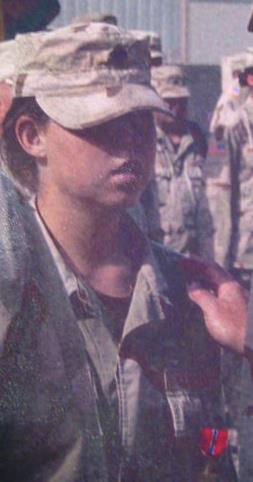
As a result of the thirty-minute engagement on March 20, Staff Sergeant Timothy Nein, Sergeant Jason Mike, and Sergeant Leigh Ann Hester were awarded the Silver Star (Staff Sergeant Nein’s award was later upgraded to the Distinguished Service Cross). In addition, Specialist Casey Cooper, Specialist William Haynes, and Ashley received Bronze Stars with “V” for valor. Significantly, Sergeant Hester’s and Ashley’s awards marked the first time female soldiers had ever received these awards for valor in actual combat.
Ashley barely made it through the June 16th award ceremony. She had somehow contracted a virus that made her so pale the three-star general pinning on her award told her to go lay down right away. She went to the base hospital, where they found her blood pressure had dipped to 65 over 30. She was hospitalized for a week before she could rejoin her unit.
In late June 2005, the members of Raven 42 were sent to Fort Leonard Wood in Missouri for a brief press tour. While they were gone, their Humvees were repainted and all Raven references removed. When they returned to Iraq on July 6, even their Raven 42 call sign was changed. These changes were necessary because of reports the insurgents had put a price on their heads after the battle of March 20.
The squad continued providing route security until the end of August 2005, when it was pulled off the line and assigned other duties. Then, on October 26, 2005, the squad and the rest of the 617th Military Police Company departed Iraq, having successfully completed its one-year deployment.
Once home in Kentucky, members of the unit were given six months off, but Ashley noticed something was wrong. With the help of her mother, Ashley registered with the Veterans Administration, and in December 2005, she was diagnosed with post-traumatic stress disorder (PTSD). After a divorce and a bureaucratic struggle that took several years to resolve, Ashley was medically retired from the Army in March 2013.
Ashley now lives in Harrodsburg, Kentucky, with her husband, Thomas Hawkins, and their family of five children. She actively supports the veteran community and recently participated in an Honor Flight to Washington, DC. And, displaying the toughness and resilience she’s shown all her life, she is currently battling breast cancer and is nearing completion of her treatment. The ordeals she’s been through have taught her not to take life for granted. She willingly talks about her experiences because she knows if she doesn’t, they will fester inside her. She has chosen not to let that happen, instead making the most of every day she is given.
Voices to Veterans is proud to salute Specialist Ashley (Pullen) Hawkins for her wartime service in Iraq with the Kentucky Army National Guard. Ashley displayed great courage in combat, not only engaging a determined enemy, but also helping save the lives of her fellow soldiers. Although we can never repay her for the sacrifices she made, we can truly thank her for her dedicated service to our country. We wish her fair winds and following seas.
If you enjoyed Ashley’s story, please sign up for the Voices to Veterans Spotlight monthly newsletter by clicking here. Once each month, you’ll receive a new written veteran’s story and a new podcast directly in your mailbox. Best of all, it’s free and you can unsubscribe at any time.

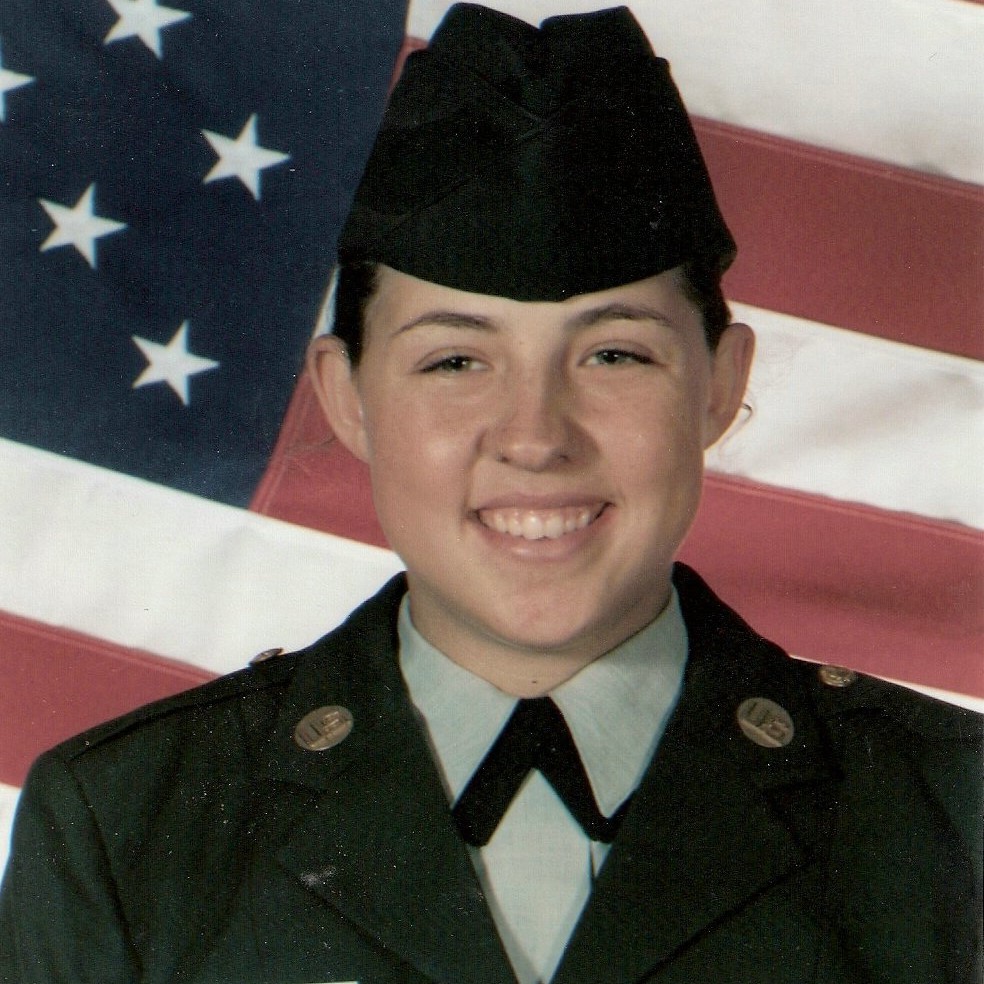
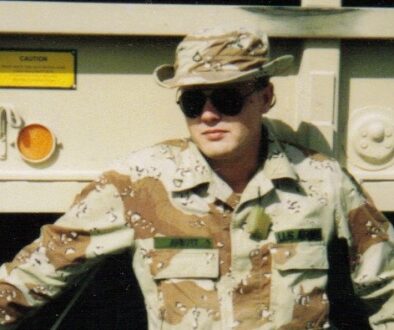
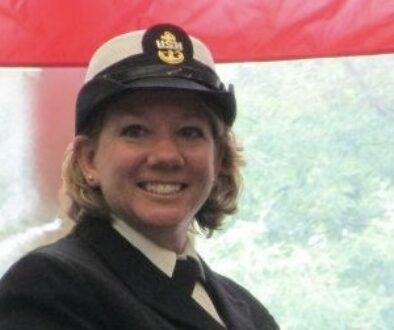
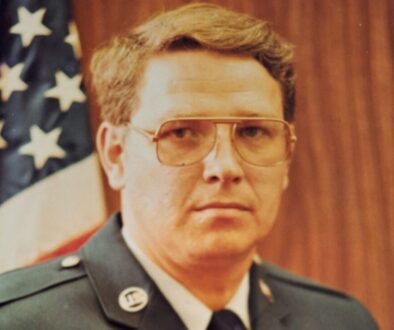
July 25, 2022 @ 3:30 PM
Training. More Training. Do it ten times and then do it again. In combat there’s no time to think or hesitate out of fear. In the chaos of close combat, the only thing you can do is rely on your training because in the madness around you it’s the only thing that makes sense. First time in combat in addition to being in charge of the squad, I was nervous. Not scared. Afterwords, I was told by a seasoned, combat vet (A member of the squad I was leading.) commented that my being under fire for the first time, I had done everything right. How? I asked myself. Training, Training, Training.
Good job, Ashely.
July 28, 2022 @ 6:55 PM
Thanks for taking the time to read Ashley’s story, and thanks for your service, as well.
July 26, 2022 @ 7:41 AM
I thank her for her service and bravery, and thank you Dave for continuing to bring these stories to all of us.
July 28, 2022 @ 6:56 PM
Rick – I really appreciate you taking the time to read Ashley’s story!
July 27, 2022 @ 1:32 AM
I’m so proud of you Ashley and your crew, I know first hand what it must have been like that day. I’m a Vietnam vet that have had a few close calls in the DMZ.
I certainly wish you and the one’s with you that day the best of health and a heart felt thank You for your service.
July 28, 2022 @ 6:56 PM
Edwin,
Thanks for taking the time to read Ashley’s story, and for your service, as well.
Dave Grogan